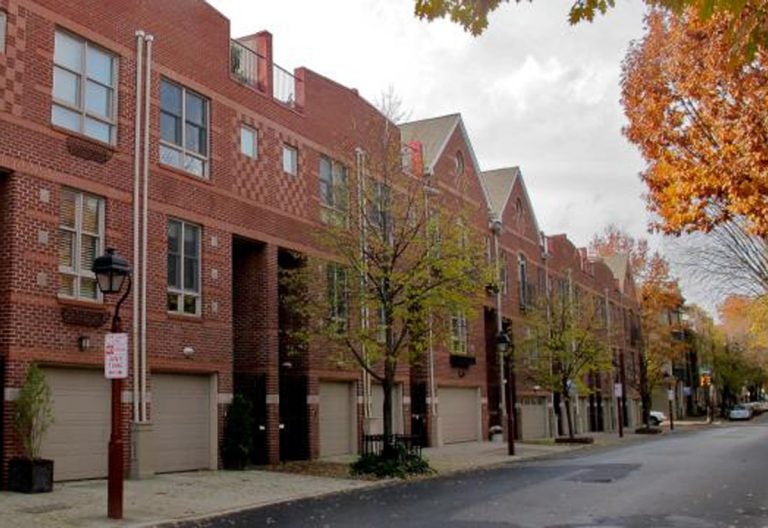‘I don’t have the support’: Blackwell defeated on bid to mandate more parking
Researchers have found that requiring more space for cars encourages less dense and more expensive housing development.

These garages on Lombard Street provide residential parking. (PlanPhilly)
West Philadelphia City Councilmember Jannie Blackwell never wanted to reduce the amount of parking required to develop new housing in Philadelphia.
For years, she’s tried to undo the relaxed parking requirements established by the city’s 2012 zoning reform.
Now, with a mere two months remaining in her quarter-century-long career in City Council, Blackwell made one more attempt to sharply increase the number of parking spaces developers have to provide with new housing.
Her bill was scheduled for a Rules Committee hearing on Wednesday morning, but at the last minute Blackwell says she placed the bill on hold.
“I don’t have the support, it’s that simple,” said Blackwell, during a phone interview about the future of her parking legislation. “I didn’t have support the last time, but I thought I’d try again while I’m here. For some reason, and I can’t pretend to understand why, I can’t get my colleagues to support it.”
The failure of Blackwell’s bill comes at a time when American municipalities are increasingly skeptical of parking minimums. In the last two years, cities as different as Buffalo, Minneapolis, and San Francisco have all moved to eliminate parking minimums entirely.
Philly’s ‘serious parking problem’
Researchers have found that requiring more spaces for cars encourages less dense and more expensive housing development, which diminishes the walkability and air quality of neighborhoods.
But from Blackwell’s perspective, communities in her West Philadelphia district need all the parking they can get.
As neighborhoods in and around University City see an influx of new development and new residents, she fears competition for spaces will only get fiercer.
“I think this bill is important because we have serious parking problems in our city,” said Blackwell, who has historically dismissed the idea of charging residents for parking in neighborhoods as a means to manage the limited supply. “I see it all over University City, West Philadelphia, Southwest Philadelphia.”
That’s why Blackwell introduced a bill in 2016 that would have doubled the parking requirements in most parts of the city, including areas like Center City where space is at a premium.
But the bill proved hugely unpopular, receiving a scathing review from the Planning Commission and oppositional testimony from affordable housing developers and community groups in Blackwell’s district.
Outraged neighbors and city planners cannot stop City Council legislation if it has sufficient support from other city officials.
Evidently, Blackwell could not secure that buy-in from colleagues. The parking bill never received a hearing.
A ‘step backward in time’
Last spring, Blackwell lost her re-election in the Democratic primary to challenger Jamie Gauthier. Gauthier has said she is committed to reforms that will help the city increase the supply of affordable housing and contribute to more environmentally-friendly, walkable neighborhoods.
Blackwell’s amended bill is a less extreme version of her original bill. It leaves out increases to parking requirements in the highest-density zoning districts that are largely found downtown and in University City.
But Blackwell still wants to increase the number of parking spaces required across most of the city. Her bill would increase parking requirements in residential neighborhoods, along commercial corridors, and on former industrial sites where the city hopes to stimulate residential-commercial redevelopment.
Both affordable and market-rate housing developers oppose the bill.
“Increasing parking requirements for residential development will decrease the amount of affordable housing we are able to produce,” wrote Garrett O’Dwyer of the Philadelphia Association of Community Development Corporations, in a letter to Rules Committee members. “These requirements would raise the cost of production per unit and require space that could otherwise be used for housing.”
The Building Industry Association, which represents housing developers in the city, also lobbied hard against the bill.
“The BIA is against this bill because we view added parking requirements as a step backward in time,” said Leo Addimando, vice-president of the BIA and a developer known for mixed-use projects such as Lincoln Square on Broad and Washington. “We view it as poor urban planning to require more parking. This will only serve to drive up the cost of development and housing.”
Shifting attitudes about transportation, density
Blackwell said she still plans to make her case at the Rules Committee hearing for her proposal, even though it won’t be up for a vote.
If she wants to try again, there will be at least two more Rules Committee hearings before the close of her last session.
City Council President Darrell Clarke is also a supporter of increasing parking minimums, so the end of Blackwell’s career will not end the support for the policy in the city’s legislative body.
At the end of the spring session, he introduced legislation to create a Zoning Code Review Commission, under his control, to propose reforms that would include increased parking minimums.
But in addition to the loss of Blackwell’s vote, another consistent Clarke ally, William Greenlee, is retiring. Republican Councilmember Brian O’Neill, who shares many of Clarke’s perspectives on zoning, is facing his first serious challenger in decades this November.
The appointees to the proposed Zoning Code Review Commission have still not been named, making any proposals unlikely to advance this session.
WHYY is your source for fact-based, in-depth journalism and information. As a nonprofit organization, we rely on financial support from readers like you. Please give today.






